 Kia Rio: Air bag warning light
Kia Rio: Air bag warning light
The purpose of the air bag warning light in your instrument panel is to alert you of a potential problem with your air bag-Supplemental Restraint System (SRS). When the ignition switch is turned ON, the indicator light should illuminate for approximately 6 seconds, then go off.
Have the system checked by an authorized Kia dealer if:
- The light does not turn on briefly when you turn the ignition ON.
- The light stays on after illuminating for approximately 6 seconds.
- The light comes on while the vehicle is in motion.
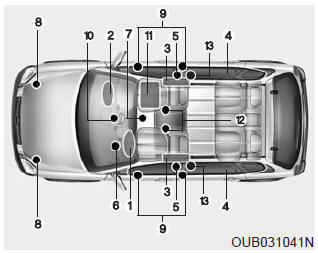
SRS components and functions
The SRS consists of the following components:
1.Driver's front air bag module
2.Passenger's front air bag module
3.Side impact air bag modules
4.Curtain air bag modules
5.Retractor pre-tensioner assemblies
6.Air bag warning light
7.SRS control module (SRSCM)
8.Front impact sensors
9.Side impact sensors
10. PASSENGER AIR BAG ŌĆ£OFFŌĆØ indicator (Front passengerŌĆÖs seat only)
11. Occupant detection system (Front passengerŌĆÖs seat only)
12. DriverŌĆÖs and front passengerŌĆÖs seat belt buckle sensors
13. Anchor pre-tensioner assemblies
The SRSCM continually monitors all SRS components while the ignition switch is ON to determine if a crash impact is severe enough to require air bag deployment or pre-tensioner seat belt deployment.
The SRS air bag warning light on the instrument panel will illuminate for about 6 seconds after the ignition switch is turned to the ON position, after which the air bag warning light should go out.
If any of the following conditions occurs, this indicates a malfunction of the SRS. Have an authorized Kia dealer inspect the air bag system as soon as possible.
- The light does not turn on briefly when you turn the ignition ON.
- The light stays on after illuminating for approximately 6 seconds.
- The light comes on while the vehicle is in motion.
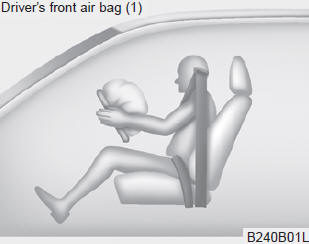
The air bag modules are located both in the center of the steering wheel and in the front passenger's panel above the glove box. When the SRSCM detects a sufficiently severe impact to the front of the vehicle, it will automatically deploy the front air bags.
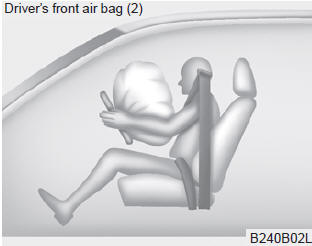
Upon deployment, tear seams molded directly into the pad covers will separate under pressure from the expansion of the air bags. Further opening of the covers then allows full inflation of the air bags.
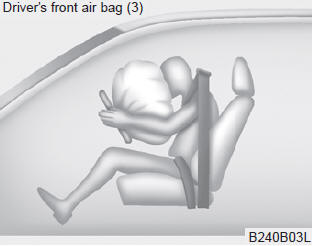
A fully inflated air bag, in combination with a properly worn seat belt, slows the driver's or the passenger's forward motion, reducing the risk of head and chest injury.
After complete inflation, the air bag immediately starts deflating, enabling the driver to maintain forward visibility and the ability to steer or operate other controls.
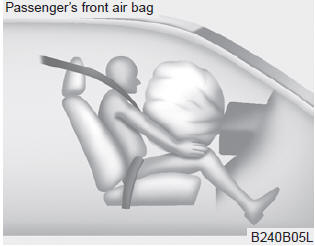
WARNING - Air bag obstructions
Do not install or place any accessories on the steering wheel, instrument panel, or on the front passenger's panel above the glove box in a vehicle Such objects may become dangerous projectiles if the air bag deploys.
✽ NOTICE
Before you replace a fuse or disconnect a battery terminal, turn the ignition switch to the LOCK position and remove the ignition key. Never remove or replace the air bag related fuse(s) when the ignition switch is in the ON position. Failure to heed this warning will cause the SRS air bag warning light to illuminate.
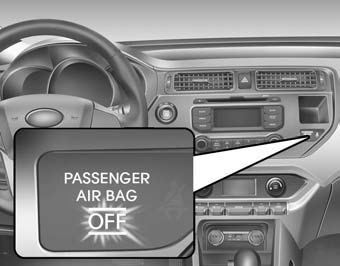
Occupant detection system
Your vehicle is equipped with an occupant detection system in the front passenger's seat.
The occupant detection system is designed to detect the presence of a properly-seated front passenger and determine if the passenger's front air bag should be enabled (may inflate) or not. The driver's front air bag is not affected or controlled by the occupant detection system.
Main components of occupant detection system
- A detection device located within the front passenger seat track.
- Electronic system to determine whether passenger air bag systems should be activated or deactivated.
- An indicator light located on the instrument panel which illuminates the words PASSENGER AIR BAG ŌĆ£OFFŌĆØ indicating the front passenger air bag system is deactivated.
- The instrument panel air bag warning light is interconnected with the occupant detection system.
If the front passenger seat is occupied by a person that the system determines to be of adult size, and he/she sits properly (sitting upright with the seatback in an upright position, centered on the seat cushion with their seat belt on, legs comfortably extended and their feet on the floor), the PASSENGER AIR BAG ŌĆ£OFFŌĆØ indicator will turn off and the front passenger's air bag will be able to inflate, if necessary, in frontal crashes.
You will find the PASSENGER AIR BAG ŌĆ£OFFŌĆØ indicator on the center facia panel. This system detects the conditions 1~4 in the following table and activates or deactivates the front passenger air bag based on these conditions.
Always be sure that you and all vehicle occupants are seated and restrained properly (sitting upright with the seat in an upright position, centered on the seat cushion, with the personŌĆÖs legs comfortably extended, feet on the floor, and wearing the safety belt properly) for the most effective protection by the air bag and the safety belt.
The ODS (Occupant Detection System) may not function properly if the passenger takes actions which can defeat the detection system.
These include:
(1) Failing to sit in an upright position.
(2) Leaning against the door or center console.
(3) Sitting towards the sides or the front of the seat.
(4) Putting legs on the dashboard or resting them on other locations which reduce the passenger weight on the front seat.
(5) Improperly wearing the safety belt.
(6) Reclining the seat back.
Condition and operation in the front passenger occupant detection system
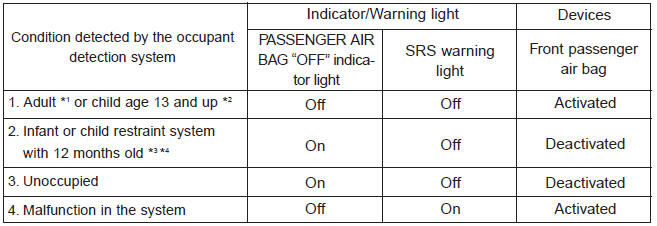
*1) The system judges a person of adult size as an adult. When a smaller adult sits in the front passenger seat, the system may recognize him/her as a child depending on his/her physique and posture.
*2) Do not allow children to ride in the front passenger seat. When a smaller child than the same age sits in the front passenger seat, the system may recognize him/her as an infant depending on his/her physique or posture.
*3) Never install a child restraint system on the front passenger seat.
*4) The PASSENGER AIR BAG "OFF" indicator may turn on or off when a child above 12 months to 12 years old (with or without child restraint system) sits in the front passenger seat. This is a normal condition.
WARNING - ODS system
Riding in an improper position adversely affects the occupant detection system (ODS) and may result in the deactivation of front passenger airbag. It is important for the driver to instruct the passenger as to the proper seating instructions as contained in this manual.
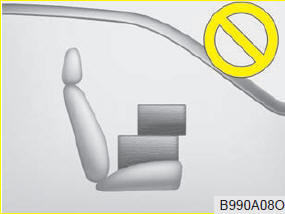
Never put a heavy load in the front passenger seat.
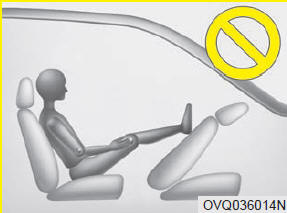
Never place the feet on the front passenger seatback.
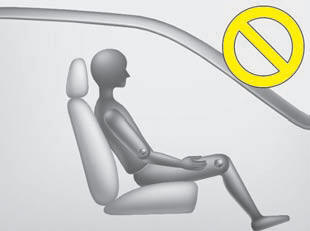
Never sit with the hips shifted towards the front of the seat.
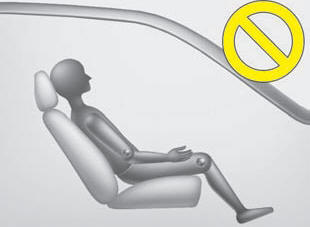
Never excessively recline the front passenger seatback.
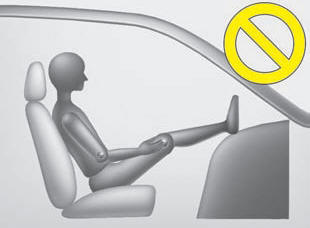
Never place the feet on the dashboard.
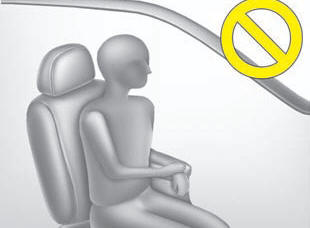
Never lean on the door or center console.Never sit on one side of the front passenger seat.
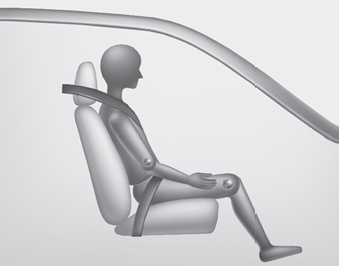
When an adult is seated in the front passenger seat, if the PASSENGER AIR BAG ŌĆ£OFFŌĆØ indicator is on, turn the ignition switch to the LOCK position and ask the passenger to sit properly (sitting upright with the seat back in an upright position, centered on the seat cushion with their seat belt on, legs comfortably extended and their feet on the floor). Restart the engine and have the person remain in that position. This will allow the system to detect the person and to enable the passenger air bag.
If the PASSENGER AIR BAG ŌĆ£OFFŌĆØ indicator is still on, ask the passenger to move to the rear seat.
WARNING - ŌĆ£AIR BAG OFFŌĆØ light
Do not allow an adult passenger to ride in the front seat when the PASSENGER AIR BAG ŌĆ£OFFŌĆØ indicator is illuminated, because the air bag will not deploy in the event of a crash. The driver must instruct the passenger to reposition himself in the seat. Failure to properly position yourself may lead to airbag deactivation resulting in airbag non-deployment and in a collision. If the PASSENGER AIR BAG ŌĆ£OFFŌĆØ indicator remains illuminated after the passenger repositions themselves properly and the car is restarted, it is recommended that passenger move to the rear seat because the passenger's front air bag will not deploy.
✽ NOTICE
The PASSENGER AIR BAG ŌĆ£OFFŌĆØ indicator illuminates for about 4 seconds after the ignition switch is turned to the ON position or after the engine is started. If the front passenger seat is occupied, the occupant detection sensor will then classify the front passenger after several more seconds.
Any child age 12 and under should ride in the rear seat. Children too large for child restraints should use the available lap/shoulder belts. No matter what type of crash, children of all ages are safer when restrained in the rear seat.
✽ NOTICE
Do not modify or replace the front passenger seat. Don't place anything on or attach anything such as a blanket, front seat covers or after market seat heater to the front passenger seat. This can adversely affect the occupant detection system.
If the occupant detection system is not working properly, the SRS air bag warning
light  on the instrument panel will
on the instrument panel will
illuminate because the passenger's front air bag is connected with the occupant
detection system. If there is a malfunction of the occupant detection system, the
PASSENGER AIR BAG ŌĆ£OFFŌĆØ indicator will not illuminate and the passenger's front
air bag will inflate in frontal impact crashes even if there is no occupant in the
front passenger's seat.
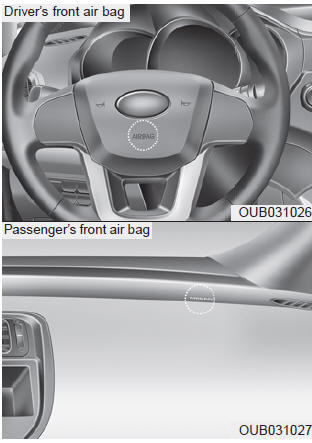
 Air bag
Air bag
(1) DriverŌĆÖs front air bag
(2) PassengerŌĆÖs front air bag
(3) Side impact air bag
(4) Curtain air bag
Even in vehicles with air bags, you and your passengers must always wear the
safety bel ...
 Driver's and passenger's front air bag
Driver's and passenger's front air bag
Your vehicle is equipped with an Advanced Supplemental Restraint (Air Bag) System
and lap/shoulder belts at both the driver and passenger seating position.
The indications of the system's prese ...
See also:
Removal
Wiper and Washer Switch
1.
Disconnect the negative (-) battery terminal.
2.
Remove the steering wheel.
(Refer to the ST group - &qu ...
Front Strut Assembly Components
ŌĆó
Tighten with specifed torque at curb position of vehicle
Ō ...
Specifications
Item
Requirement
Remark
Rated voltage
DC 12V
Shall activate normally in these range.
Operating voltage range
DC 9 ~ 16V
...
 Air bag
Air bag
(1) DriverŌĆÖs front air bag
(2) PassengerŌĆÖs front air bag
(3) Side impact air bag
(4) Curtain air bag
Even in vehicles with air bags, you and your passengers must always wear the
safety bel ...
 Driver's and passenger's front air bag
Driver's and passenger's front air bag
Your vehicle is equipped with an Advanced Supplemental Restraint (Air Bag) System
and lap/shoulder belts at both the driver and passenger seating position.
The indications of the system's prese ...
See also:
Removal
Wiper and Washer Switch
1.
Disconnect the negative (-) battery terminal.
2.
Remove the steering wheel.
(Refer to the ST group - &qu ...
Front Strut Assembly Components
ŌĆó
Tighten with specifed torque at curb position of vehicle
Ō ...
Specifications
Item
Requirement
Remark
Rated voltage
DC 12V
Shall activate normally in these range.
Operating voltage range
DC 9 ~ 16V
...
